1- Our Party and State always attach importance to and promote the value of cultural heritage. That system of cultural heritage represents the mettle, intelligence, and character of the Vietnamese people, containing high values in history, science, education, etc. It is an endless resource for developing cultural industries with diverse, unique products of high economic value, contributing increasingly to the country's GDP.
Cultural heritages in coastal and island areas are an inseparable part of Vietnam's cultural heritage. With 21/34 provinces and cities across the country having seas and islands, the system of cultural heritages in coastal and island areas of our country is very rich, unique and plays an important role in the economic and social life of the people. According to incomplete statistics, coastal and island areas of our country have more than 1,000 heritages, historical and cultural relics, and scenic spots with unique architecture, such as communal houses, temples, pagodas, shrines...; along with a rich system of archaeological relics that demonstrate the long-standing culture of our nation (Dong Son culture in the North, Sa Huynh culture in the Central, Oc Eo culture in the South); Ancient trading ports, such as Van Don (Quang Ninh province), Hoi An, Cu Lao Cham (now Da Nang city), Thi Nai (now Gia Lai province), Oc Eo ( An Giang province) were once bustling, important and famous port centers in the ancient trade routes in the three regions of the North, Central and South.
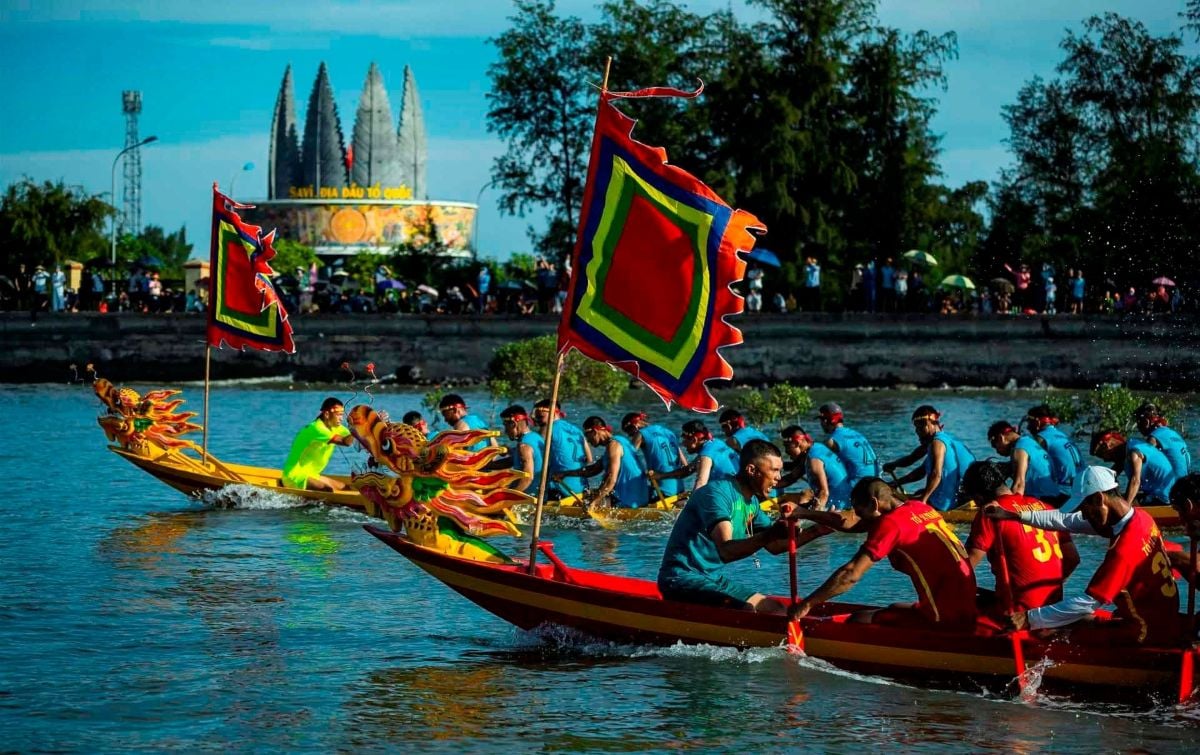
Each cultural heritage of the sea and islands is associated with beliefs and religions and is a place to practice beliefs, a place to remember and commemorate the merits of those who have contributed to building and defending the country, helping people exploit the sea and islands throughout history. These are the massive mausoleums and temples worshiping "Mr. Nam Hai"; Whale Temples in many provinces and cities; Quan Lan Communal House, Tra Co Communal House (Quang Ninh Province); Doc Cuoc Temple (Thanh Hoa Province); Con Temple (Nghe An Province); Ly Hai Communal House, Am Linh Tu (Ly Son Island, Quang Ngai Province); Whale Temples in the Central provinces; Tran Khanh Du Temple (Van Don, Quang Ninh Province ); Nguyen Trung Truc Temple (Rach Gia, now An Giang Province); Bach Dang Relic Site (Quang Ninh Province and Hai Phong City); Unnumbered Wharf (Hai Phong City); Vinh Moc Tunnels (Quang Tri Province ); Ho Chi Minh Trail at Sea; Rach Gam - Xoai Mut Area; Nam Can Base in Ca Mau; Central Office of Southern Vietnam base area; Con Dao Prison relic sites, Phu Quoc Prison...
In addition, the system of intangible cultural heritage in the treasure trove of cultural heritage of Vietnam's seas and islands is extremely rich, expressed in many forms, such as life experiences accumulated and applied through daily life, labor, and production of sea and island residents; beliefs, folk songs, legends, and myths created and absorbed from many cultures and civilizations; customs, practices, performing arts, cultural activities, folk games, traditional crafts with many unique products; valuable knowledge about traditional medicine and pharmacy, culinary culture, traditional costumes, etc., all creating a unique cultural space of the countryside, typical of the coastal and island rural areas of the Vietnamese ethnic community in the process of using and exploiting the sea. In particular, the extremely rich festival system is a unique cultural heritage of the coastal and island residents of our country.
Vietnam's sea and island cultural heritage also includes historical books, royal records, woodblocks, maps, nautical charts, of which the most prominent is the Royal Records of the Nguyen Dynasty, which has just been recognized as a World Memory Heritage by the United Nations Educational, Scientific and Cultural Organization (UNESCO). These are extremely meaningful documents, contributing to affirming the sovereignty of our country and people over the two archipelagos of Truong Sa and Hoang Sa. All of these cultural heritages have become valuable human resources, one of the advantages for our coastal and island provinces to develop their socio-economy.
2- In the general socio-economic development guidelines and policies of our country, our Party always emphasizes the importance of preserving and promoting the value of cultural heritages, while emphasizing the need for a harmonious connection between preserving and promoting the value of cultural heritages and socio-economic development, towards the goal of sustainable development.
Resolution No. 36-NQ/TW, dated October 22, 2018, of the 8th Central Conference, Session XII on "Vietnam's sustainable marine economic development strategy to 2030, vision to 2045" clearly stated the viewpoint: “The sea is a component of the sacred sovereignty of the Fatherland, a living space, a gateway for international exchange, closely linked to the cause of building and protecting the Fatherland... Vietnam must become a strong maritime nation, rich from the sea, with sustainable development, prosperity, security and safety... Sustainable development of the marine economy on the basis of green growth, conservation of biodiversity, marine ecosystems; ensuring harmony between economic and natural ecosystems, between conservation and development (1) .
Resolution No. 33-NQ/TW, dated June 9, 2014, of the 9th Central Conference, Session XI "On building and developing Vietnamese culture and people to meet the requirements of sustainable national development" determined the goal of building "culture to truly become a solid spiritual foundation of society, an important endogenous strength to ensure sustainable development and firmly protect the Fatherland, for the goal of a rich people, a strong country, democracy, fairness, and civilization" (2) . At the same time, the Resolution emphasized the viewpoint: "Harmonious development between economy and culture; need to pay full attention to cultural and human factors in economic development" (3) .
The Resolution also emphasizes that, in addition to the task of preserving and embellishing typical historical and cultural relics, serving traditional education and economic development, linking the preservation and promotion of cultural heritage with tourism development, it is necessary to link cultural activities with socio-economic development; build a mechanism to reasonably and harmoniously resolve the relationship between the preservation and promotion of cultural heritage and socio-economic development. Among the solutions proposed by the Resolution, there is a mention of the requirement to improve the effectiveness and efficiency of state management of culture; harmoniously handle the relationship between economic development and cultural development. Resolution No. 08-NQ/TW, dated January 16, 2017, of the Politburo "On developing tourism into a spearhead economic sector" also affirms the viewpoint of sustainable tourism development; preserving and promoting cultural heritages and fine traditional values of the nation; protecting the environment and nature.
Institutionalizing the Party's policy, the State has issued programs and strategies for cultural development, including cultural heritage of the sea and islands, along with a system of related legal documents. "Cultural development strategy to 2020" (approved in Decision No. 581/QD-TTg, dated May 6, 2009 of the Prime Minister) identifies the goal of creating all conditions to improve the level of enjoyment and participation in cultural activities and creativity of the people; striving to gradually narrow the gap in cultural and artistic enjoyment between urban and rural areas, between plains and mountainous areas, ethnic minority areas, remote areas, border areas, and islands. The "Cultural Development Strategy to 2030" (approved by the Prime Minister in Decision No. 1909/QD-TTg, dated November 12, 2021) emphasizes the goal of building and developing Vietnamese culture and people comprehensively, in line with the trend of the times, the requirements of the Fourth Industrial Revolution and its great impacts on the economy and society; constantly improving the spiritual life of the people, gradually narrowing the gap in cultural enjoyment between urban and rural areas, between regions. The Resolution also emphasizes solutions to organize diverse cultural and artistic programs to serve people in remote, border, island and ethnic minority areas; investing in preserving, renovating and restoring special national relics, world heritages, historical and cultural relics of typical value, serving traditional education and economic development; linking the preservation and promotion of cultural heritage with tourism development.
3- Cultural heritage is a human resource, a valuable treasure, a material, a source of capital, and a driving force for the socio-economic development of our country's sea and island regions. Through socio-economic activities, focusing on tourism, the cultural heritage values of sea and island regions have the opportunity to be widely spread and promoted to a large number of domestic and foreign tourists; thereby contributing to the positioning of regional brands, not only bringing benefits to businesses, but also creating jobs, livelihoods, contributing to improving the income and quality of life of coastal and island residents. Those benefits are also shared for reinvestment, conservation, embellishment, honor, restoration, management and promotion of the value of cultural heritage.
Based on the identification of strengths from the treasure trove of unique cultural heritages in coastal and island areas, in recent times, coastal provinces and cities in our country have made many efforts in linking the conservation and promotion of cultural heritage values with local socio-economic development, contributing to promoting sustainable local development. Heritage tourism associated with sea and island tourism with many attractive tourism products has been attracting many domestic and foreign tourists. However, in recent times, the "hot" growth and uncontrolled tourism development in some localities have been negatively affecting cultural heritage, leaving alarming consequences. Over-commercial exploitation, tourist overload, heritage abuse, lack of cultural and historical knowledge, etc. have caused the heritage in some places to deteriorate, even distort and reduce its value. In many places, the exploitation of cultural heritage and marine and island resources is lacking direction, causing environmental pollution. Traditions, customs, habits, and cultural identities in some localities are fading away. The downside of the market economy and the international integration process has negative impacts on historical and cultural relics and the landscape environment of coastal and island areas. In addition, a large number of people are not fully aware of their role as subjects in cultural heritage. In many localities, many people have not yet benefited from the promotion of heritage values, so they are not proactive and voluntary in preserving cultural heritage.
To ensure the harmony between the conservation and promotion of cultural heritage values with socio-economic development in coastal and island areas in particular and the whole country in general, towards the goal of sustainable development, it is necessary to synchronously implement the following solutions:
Firstly, improve the effectiveness of propaganda activities to raise awareness of Party committees, authorities and people in coastal and island areas in particular and the whole country in general about the position and role of preserving and promoting cultural heritage in socio-economic development, as well as the objective requirements of ensuring harmonious relationships. Party committees and authorities at all levels lead and direct relevant agencies and units through various forms of propaganda on mass media, grassroots information, promote the positive aspects of social media, educational activities, exhibitions, museums, festivals and other cultural activities to contribute to enhancing the love, pride and responsibility of Party committees, authorities, and communities of sea and island residents in preserving and promoting the value of cultural heritage, protecting the ecological environment in the process of exploiting valuable cultural resources, creating livelihoods, improving the material and spiritual life of the people, towards the goal of sustainable development and firmly protecting the sacred sovereignty of the sea and islands of the Fatherland.
Second , improve the effectiveness of state management of cultural heritage in coastal and island areas. Complete institutions, policies, strategies, planning and plans for sustainable development of the marine economy, including tourism. Review, supplement and develop new strategies, planning and plans related to the sea and islands in the direction of comprehensive management, suitable for the marine ecosystem, ensuring a harmonious and synchronous connection between conservation and development. Strengthen coordination to create unity, synchronization and inter-sectoral coordination in building and adjusting plans for sustainable development of coastal and island areas in conjunction with appropriate measures to protect and effectively exploit the treasure trove of cultural heritage in coastal provinces and cities and protect the marine environment. Focus on investing in preserving, restoring and rehabilitating world heritage sites and historical and cultural relics of typical value in coastal and island areas. Inventory, establish and publish a list of tangible and intangible cultural heritages in coastal areas and on islands, and establish marine cultural museums. Proactively decentralize the management of relics to local authorities and communities in accordance with reality. Develop policies on socialization of relic conservation and restoration activities, which stipulate the rights and responsibilities of those who contribute capital for restoration and restoration, the rights and responsibilities of local authorities managing relics, etc. Develop a "Heritage Restoration Fund", which clearly stipulates the source of revenue from tourism contributions and regulations on transparent, public, scientific and effective fund management. Innovate and improve the treatment and honor of artisans; create conditions for artisans to participate in teaching and promoting heritage in communities in coastal localities and across the country. Link the work of preserving and promoting the value of cultural heritages of the sea and islands with the cause of protecting the Fatherland's sovereignty in the East Sea.
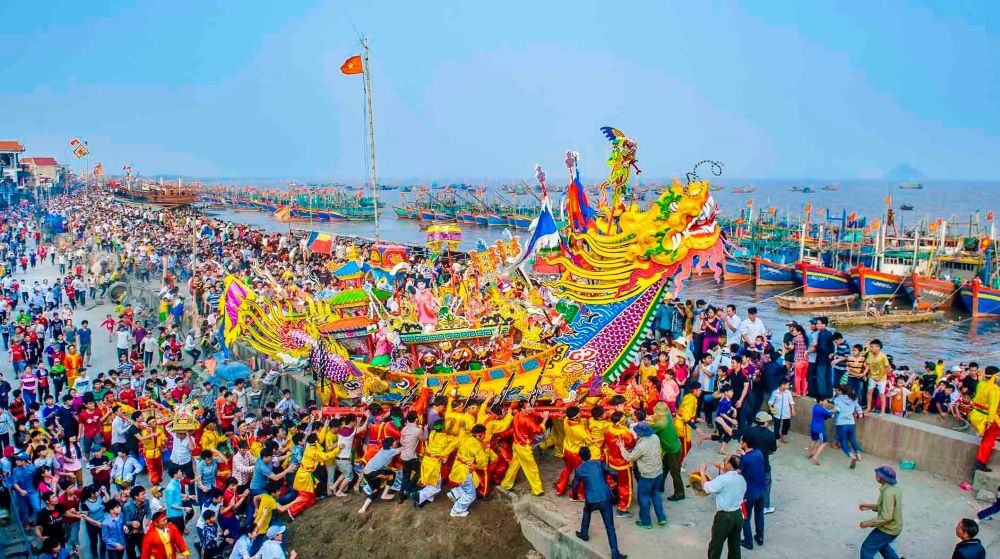
Third, promote the role of coastal and island communities in the process of preserving and promoting the value of cultural heritage and socio-economic development. Encourage the community to participate in heritage management. Enhance the understanding of cultural heritage subjects (including households) about the role of cultural behavior, business ethics, national pride in heritage exploitation activities, tourism business and providing related services, in promoting and introducing cultural heritage to tourists. Propose policies to support the lives of people in villages that still preserve the cultural values of coastal and island areas in the process of economic transformation from agriculture and fisheries to tourism services, forming unique tourism products of coastal and island residents. In particular, there should be policies to encourage the maintenance, restoration and development of traditional crafts of typical value or at risk of being lost, and to build them into unique tourism products, contributing to protecting the legitimate interests of the people.
Fourth, build a mechanism to coordinate and share benefits from heritage tourism in coastal and island areas.
It is necessary to unify the viewpoint that heritage conservation is the top principle, not "sacrificing" heritage to develop tourism at all costs, paying special attention to the life cycle, "lifespan" of tourist sites and areas, and preventing overloading in welcoming visitors. It is necessary to build a strategy to best use environmental resources, identifying the natural environment and ecological landscape as a prerequisite for future tourism development; harmoniously resolving the relationship between the interests of parties participating in tourism activities, in which promoting the role of the local community as the owner in benefiting. B Ensure long-term economic activities, orienting local communities to both practice traditional economy and participate in tourism business. Ensure the right to access, participate, benefit and responsibility of people towards the sea and islands in a fair and equal manner. Profits from tourism need to be distributed fairly, contributing to hunger eradication and poverty reduction in coastal and island localities, helping to balance traditional economic development with tourism development.
Fifth, build a suitable cultural tourism development strategy, in which select specific tourism products based on promoting the value of cultural heritage. Focus on investing in tourism infrastructure; encourage and create conditions for economic sectors to participate in developing eco-tourism, scientific exploration, community tourism, high-quality sea resort tourism in coastal areas; build, develop, diversify international-class sea tourism products, product chains, and brands on the basis of preserving biodiversity, promoting the value of unique natural, cultural, and historical heritage of our country's seas and islands.
Localities need to develop and complete plans for community tourism and heritage tourism, not allowing people to spontaneously build community tourism sites. Develop tourism products that carry the spirit of traditional culture, with many unique elements specific to the sea and islands of each ethnic group, thereby increasing the attractiveness and competitiveness of tourism products. Improve the quality of human resources in the tourism industry, focusing on training and fostering knowledge of cultural tourism and heritage tourism. Promote international cooperation activities on management, use and sustainable conservation of cultural values of seas and islands in the current context of international integration./.
-------------------------
(1) Documents of the 8th Conference of the 12th Central Executive Committee, Central Party Office, Hanoi, 2018, pp. 81, 82
(2) Documents of the 9th Conference of the 11th Central Executive Committee, Central Party Office, Hanoi, 2014, p. 47
(3) Documents of the 9th Conference of the 11th Central Executive Committee, op. cit. , p. 47
Source: https://tapchicongsan.org.vn/web/guest/van_hoa_xa_hoi/-/2018/1134502/phat-huy-gia-tri-di-san-van-hoa-vung-bien%2C-dao-nuoc-ta-hien-nay.aspx


![[Photo] Prime Minister Pham Minh Chinh chairs the Government's online conference with localities](https://vphoto.vietnam.vn/thumb/1200x675/vietnam/resource/IMAGE/2025/10/5/264793cfb4404c63a701d235ff43e1bd)

![[Photo] Prime Minister Pham Minh Chinh launched a peak emulation campaign to achieve achievements in celebration of the 14th National Party Congress](https://vphoto.vietnam.vn/thumb/1200x675/vietnam/resource/IMAGE/2025/10/5/8869ec5cdbc740f58fbf2ae73f065076)










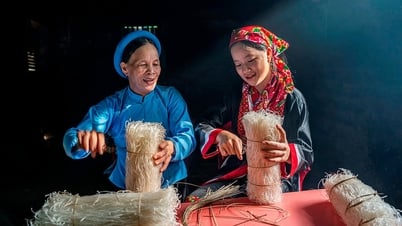
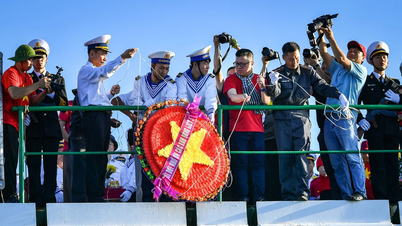

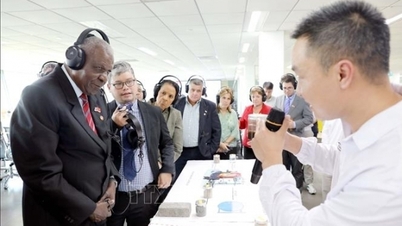

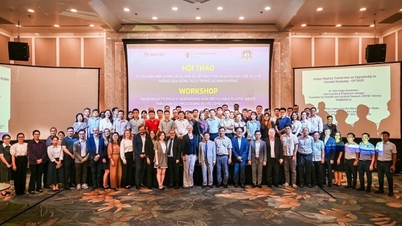



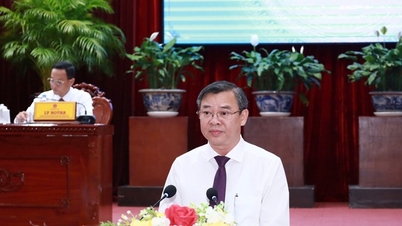































![[VIDEO] Summary of Petrovietnam's 50th Anniversary Ceremony](https://vphoto.vietnam.vn/thumb/402x226/vietnam/resource/IMAGE/2025/10/4/abe133bdb8114793a16d4fe3e5bd0f12)

![[VIDEO] GENERAL SECRETARY TO LAM AWARDS PETROVIETNAM 8 GOLDEN WORDS: "PIONEER - EXCELLENT - SUSTAINABLE - GLOBAL"](https://vphoto.vietnam.vn/thumb/402x226/vietnam/resource/IMAGE/2025/7/23/c2fdb48863e846cfa9fb8e6ea9cf44e7)














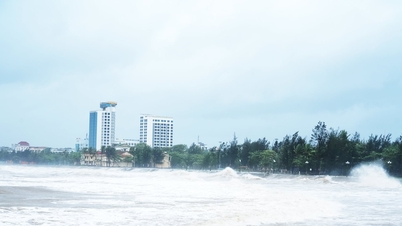



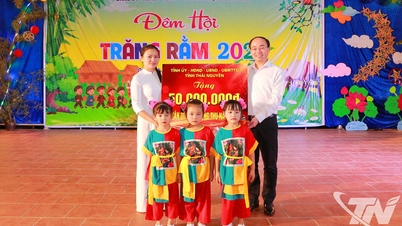


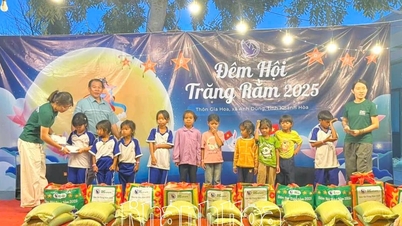

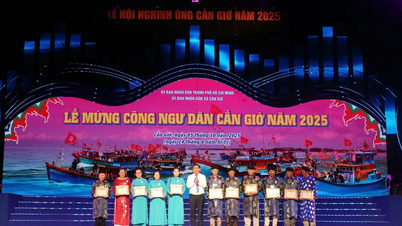













Comment (0)